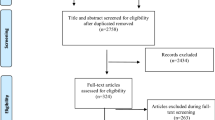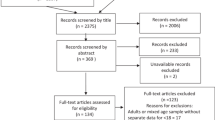Abstract
Objectives
Little is known about the impact of recessions on young people’s socioeconomic inequalities in health. This study investigates the impact of the economic recession in terms of youth unemployment on socioeconomic inequalities in psychological health complaints among adolescents across Europe and North America.
Methods
Data from the WHO collaborative ‘Health Behaviour in School-aged Children’ (HBSC) study were collected in 2005/06 (N = 160,830) and 2009/10 (N = 166,590) in 31 European and North American countries. Logistic multilevel models were used to assess the contribution of youth unemployment in 2009/10 (enduring recession) and the change in youth unemployment (2005–2010) to adolescent psychological health complaints and socioeconomic inequalities in complaints in 2009/10.
Results
Youth unemployment during the recession is positively related to psychological health complaints, but not to inequalities in complaints. Changes in youth unemployment (2005–2010) were not associated with adolescents’ psychological health complaints, whereas greater inequalities in complaints were found in countries with greater increases in youth unemployment.
Conclusions
This study highlights the need to tackle the impact of increasing unemployment on adolescent health and health inequalities during economic recessions.


Similar content being viewed by others
References
Andersen AN, Krølner R, Currie C, Dallago L, Due P, Richter M, Örkényi Á, Holstein BE (2008) High agreement on family affluence between children’s and parents’ reports: international study of 11-year-old children. J Epidemiol Community Health 62(12):1092–1094
Bell DNF, Blanchflower DG (2011) Young people and the great recession. Oxford Rev Econ Pol 27(2):241–267
Boyce WT, Torsheim T, Currie C, Zambon A (2006) The family affluence scale as a measure of national wealth: validation of an adolescent self-report measure. Soc Indic Res 78(3):473–487
Catalano R, Goldman-Mellor S, Saxton K, Margerison-Zilko C, Subbaraman M, LeWinn K, Anderson E (2011) The health effects of economic decline. Annu Rev Public Health 32(1):431–450
Choudhry M, Marelli E, Signorelli M (2010) The impact of financial crises on youth unemployment rate. Quaderni del Dipartimento di Economia Finanza e Statistica 79:2010
Chzhen Y (2014) Child poverty and material deprivation in the European Union during the Great Recession. Innocenti Working Paper 2014-06, Florence. https://www.unicef-irc.org/publications/723/. Accessed 19 April 2016
Coutts AP, Stuckler D, Cann DJ (2014) The health and wellbeing effects of active labor market programs. In: Cooper CL (ed) Wellbeing, vol 6. Wiley, Chichester, pp 1–18
Cui W, Zack MM (2013) Trends in health-related quality of life among adolescents in the United States, 2001–2010. Prev Chronic Dis 10:E111. doi:10.5888/pcd10.120334
Currie C, Molcho M, Boyce W, Holstein BE, Torsheim T, Richter M (2008a) Researching health inequalities in adolescents: the development of the health behaviour in school-aged children (HBSC) family affluence scale. Soc Sci Med 66(6):1429–1436
Currie C, Nic Gabhainn S, Godeau E, Roberts C (2008) Inequalities in Young People´s Health. HBSC International Report from the 2005/2006 Survey, World Health Organization (WHO), Copenhagen
Currie C, Nic Gabhainn S, Godeau E, International, HBSC Network Coordinating Committee (2009) The Health Behaviour in School-aged Children: WHO Collaborative Cross-National (HBSC) study: origins, concept, history and development 1982-2008. Int J Public Health 54(Suppl 2):131–139
Currie C, Zanotti C, Morgan A, Currie DB, de Looze M, Roberts C, Samdal O, Smith O, Barnekow V (2012) Social determinants of health and well-being among young people. Health Behaviour in School-aged Children (HBSC) study: international report from the 2009/2010 survey. Health Policy for Children and Adolescents, No. 6, WHO Regional Office for Europe, Copenhagen
Evans GW, Kim P (2007) Childhood Poverty and Health: cumulative Risk Exposure and Stress Dysregulation. Psychol Sci 18(11):953–957
Gavrilovic M, Marcus R (2010) The Impacts of the Economic Crisis on Youth. Review of Evidence, London, UK. http://r4d.dfid.gov.uk/PDF/Outputs/Mis_SPC/60828_Youth-Evidence-Review-Final.pdf. Accessed 19 April 2016
Harper C, Jones N, Pereznieto P, McKay A (2011) Promoting children’s well-being: policy lessons from past and present economic crises. Dev Policy Rev 29(5):621–641
Hempel K, Wuermli A, Lundberg M (2012) Adolescence: Protecting and Promoting Human Development in Times of Economic Shocks. Social protection and labor policy note 13, Washington, D.C. http://www-wds.worldbank.org/external/default/WDSContentServer/WDSP/IB/2012/06/15/000333038_20120615024136/Rendered/PDF/699950BRI00PUB0icy0Note01300PUBLIC0.pdf. Accessed 12 April 2016
Holmqvist G, Natali L (2014) Exploring the Late Impact of the Great Recession Using Gallup World Poll Data. Innocenti Working Paper 2014-14, Florence. https://www.unicef-irc.org/publications/728/. Accessed 19 April 2016
Holstein BE, Currie C, Boyce WT, Damsgaard MT, Gobina I, Kökönyei G, Hetland J, de Looze M, Richter M, Due P, The HBSC Social Inequalities Focus Group (2009) Socio-economic inequality in multiple health complaints among adolescents: International comparative study in 37 countries. Int J Public Health 54:260–270
Institute of Health Equity for the London Health Inequalities Network (2012) The impact of the economic downturn and policy changes on health inequalities in London, London. https://www.instituteofhealthequity.org/projects/demographics-finance-and-policy-london-2011-15-effects-on-housing-employment-and-income-and-strategies-to-reduce-health-inequalities, zuletzt geprüft am 24.07.2014. Accessed 16 March 2016
International Labour Office (2013) Global employment trends for youth 2013: a generation at risk. International Labour Office
Karanikolos M, Mladovsky P, Cylus J, Thomson S, Basu S, Stuckler D, Mackenbach JP, McKee M (2013) Financial crisis, austerity, and health in Europe. Lancet 381(9874):1323–1331
Kondo N, Subramanian SV, Kawachi I, Takeda Y, Yamagata Z (2008) Economic recession and health inequalities in Japan: analysis with a national sample, 1986–2001. J Epidemiol Community Health 62(10):869–875
Lundberg M, Wuermli A (eds) (2012) Children and youth in crisis: Protecting and promoting human development in times of economic shocks. Directions in development. Human development. World Bank, Washington D.C.
Marmot MG, Allen J, Bell R, Bloomer E, Goldblatt P (2012) WHO European review of social determinants of health and the health divide. Lancet 380(9846):1011–1029
McLoyd VC, Kaplan R, Purtell KM, Bagley E, Hardaway CR, Smalls C (2009) Poverty and Socioeconomic Disadvantage in Adolescence. In: Lerner RM, Steinberg LD (eds) Handbook of Adolescent Psychology, 3rd edn. Wiley, Hoboken, pp 444–491
Novo M, Hammarström A, Janlert U (2001) Do high levels of unemployment influence the health of those who are not unemployed? A gendered comparison of young men and women during boom and recession. Soc Sci Med 53(3):293–303
OECD (2012) Social spending after the crisis, Paris. http://www.oecd.org/els/soc/OECD2012SocialSpendingDuringTheCrisis8pages.pdf. Accessed 19 April 2016
Pfoertner T, Rathmann K, Elgar FJ, Looze Md, Hofmann F, Ottova-Jordan V, Ravens-Sieberer U, Bosakova L, Currie C, Richter M (2014) Adolescents’ psychological health complaints and the economic recession in late 2007: a multilevel study in 31 countries. Eur J Public Health 24(6):961–967
Rabe-Hesketh S, Skrondal A (2012) Multilevel and longitudinal modeling using stata. Stata Press, College Station
Rajmil L, Medina-Bustos A, Fernandez de Sanmamed M, Mompart-Penina A (2013) Impact of the economic crisis on children’s health in Catalonia: a before-after approach. BMJ Open 3(8):e003286. doi:10.1136/bmjopen-2013-003286
Rajmil L, Herdman M, Ravens-Sieberer U, Erhart M, Alonso J (2014a) Socioeconomic inequalities in mental health and health-related quality of life (HRQOL) in children and adolescents from 11 European countries. Int J Public Health 59(1):95–105
Rajmil L, de Sanmamed MF, Choonara I, Faresjö T, Hjern A, Kozyrskyj AL, Lucas PJ, Raat H, Séguin L, Spencer N et al (2014b) Impact of the 2008 economic and financial crisis on child health: a systematic review. Int J Environ Res Publ Health 11(6):6528–6546
Ravens-Sieberer U, Erhart M, Torsheim T, Hetland J, Freeman J, Danielson M, Thomas C, Hbsc Positive Health Group (2008) An international scoring system for self-reported health complaints in adolescents. Eur J Public Health 18(3):294–299
Reine I, Novo M, Hammarström A (2008) Does transition from an unstable labour market position to permanent employment protect mental health? Results from a 14-year follow-up of school-leavers. BMC Public Health 8(1):159–169
Richardson D (2010) Child and family policies in a time of economic crisis. Child Soc 24(6):495–508
Schnohr CW, Molcho M, Rasmussen M, Samdal O, de Looze M, Levin K, Roberts CJ, Ehlinger V, Krolner R, Dalmasso P, Torsheim T (2015) Trend analyses in the health behaviour in school-aged children study: methodological considerations and recommendations. Eur J Public Health 25(suppl 2):7–12
Starfield B, Riley AW, Witt WP, Robertson J (2002) Social class gradients in health during adolescence. J Epidemiol Community Health 56(5):354–361
Strandh M, Nilsson K, Nordlund M, Hammarström A (2015) Do open youth unemployment and youth programs leave the same mental health scars? Evidence from a Swedish 27-year cohort study. BMC Public Health 15(1):1151–1158
Stuckler D, Basu S, Suhrcke M, Coutts A, McKee M (2009) The public health effect of economic crises and alternative policy responses in Europe: an empirical analysis. Lancet 374(9686):315–323
UNICEF (2014) Children of the Recession: The impact of the economic crisis on child well-being in rich countries. Innocenti Report Card 12, Florence. https://www.unicef-irc.org/publications/733. Accessed 19 April 2016
Urbanos-Garrido RM, Lopez-Valcarcel BG (2015) The influence of the economic crisis on the association between unemployment and health: an empirical analysis for Spain. Eur J Health Econ 16(2):175–184
Verick S (2009) Who is Hit Hardest during a Financial Crisis?: The Vulnerability of Young Men and Women to Unemployment in an Economic Downturn. IZA Discussion Paper 4359, Bonn. http://www.ftp.iza.org/dp4359.pdf Accessed 19 April 2016
Acknowledgments
The Health Behaviour in School-aged Children (HBSC) study is an international survey conducted in collaboration with the WHO Regional Office for Europe. The current International Coordinator of the study is Candace Currie, CAHRU, University of St Andrews, Scotland. The data bank manager is Oddrun Samdal, University of Bergen, Norway. The data collection in each country was funded at the national level. We are grateful for the financial support offered by the various government ministries, research foundations and other funding bodies in the participating countries and regions.
Author information
Authors and Affiliations
Corresponding author
Rights and permissions
About this article
Cite this article
Rathmann, K., Pförtner, TK., Hurrelmann, K. et al. The great recession, youth unemployment and inequalities in psychological health complaints in adolescents: a multilevel study in 31 countries. Int J Public Health 61, 809–819 (2016). https://doi.org/10.1007/s00038-016-0866-0
Received:
Revised:
Accepted:
Published:
Issue Date:
DOI: https://doi.org/10.1007/s00038-016-0866-0




